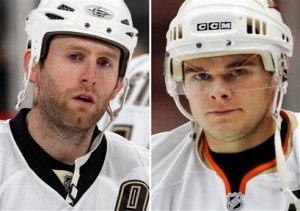When their team underperforms for a season, fans get upset with the organization. When their team underperforms for several seasons, they own it.
A good example is the firing of Maple Leafs coach Ron Wilson by Brian Burke, who seemed to be acting almost directly on behalf of the fans. They wanted Wilson gone more than anything. The Leafs are a team with slightly lower expectations, and they’re under a lot more pressure, but their situation is similar to the one that the Ducks are in. The bar is just set higher in Anaheim with their recent ability to make the playoffs, and a far more recent championship to speak of. Every hockey fanbase has their own expectations of their club, and the history of each club is what determines them.
When any team with higher expectations approaches the post-season, its fans are more likely to tremble at the thought of an early summer for their boys. This is especially the case when the team’s chances – which are always expected to be good — are slim and improbable.
Bob Murray took over as GM of the Ducks with some relatively big chairs to throw . . . I mean shoes to fill. Excuse me.
Brian Burke’s championship campaign as GM of the Ducks, the proceeding year, was executed with such confidence that it romanticized the team, and raised the bar unrealistically high. This is not to say that a team’s success can all be attributed to a GM, but it was likely pretty intimidating for Murray to replace a man who helped take the Ducks to the top for the very first time.

It is obviously very uncommon for a team’s losing ways to change rapidly after a retooling. When a GM shakes things up with a bevy of trades, to replace certain underachievers who were once integral to the team’s success, it is almost always a shot in the dark. Maybe it’s to ensure fans that management is serious about winning, or maybe it’s to demonstrate a willingness to do anything it takes to win. There are plenty of explanations, but a move like trading a slumping Chris Kunitz, and not seeing him as invaluable to the team’s future, seems to be too risky of a gamble. As was trying to replace the magnificent shut-down chemistry of Pahlsson and Moen. Stats or video usually won’t reveal a player’s future chemistry with your team or city, for example, and so it’s always like a box of chocolates when any part of a team is retooled.
The Ducks have made the playoffs in three of the last four years, but they haven’t made it past the first round. This is big for Ducks fans who will always measure the team’s future by the year they went all the way. There are obviously teams who would love to say they’ve made the playoffs at all in the last four years, but it is important to remember where the bar is set for a team and their fans.
It is not necessarily a shot at Bob Murray to state that the problem with the Ducks may lie higher than coaching (I recently touched on whether or not Murray’s coaching change was a prudent one) or playing. Sometimes you try your hand at something, you give it your best shot, and it just doesn’t fly. It is not always necessarily “bad managing.”
Is it fair to place the blame on the players?
Maybe.
Maybe the current Ducks defensive core are the culprits in this underwhelming season, but many fans seem to feel (more truly this time around) that Murray has overstayed his welcome as GM of their team, and that this should be his last-ditch effort.
Unfortunately, fans will never have the luxury of knowing what their club’s owner is thinking, that is, unless you’re a Blue Jackets fan. So it remains to be seen which direction the Ducks will take in the off-season but, when the fans start to own a team, heads do tend to roll from the top.
—
Follow me on Twitter @AmosLegaultTHW